
Report for the 2020 Utah Gubernatorial Nominees
Utah Governor’s Office of Economic Development
August 2020
Utah


Report for the 2020 Utah Gubernatorial Nominees
Utah Governor’s Office of Economic Development
August 2020
Utah

Val Hale
vhale@utah.gov
801-538-8769
The Utah Governor’s Office of Economic Development (GOED) supports Utah businesses and fosters the state’s innovative, hard-working, entrepreneurial spirit.
GOED engages with Utah’s business leaders to build strategies that maintain a diversified economy and strengthen the business supply chain while advancing Utah’s unprecedented partnerships in industry, education and workforce development.
GOED is also charged with enhancing Utahns’ quality of life and visitors’ experience with Utah’s natural and cultural wonders. The agency supports the governor’s office and works to manage and promote Utah’s brand through business, diplomacy, travel and tourism, film and outdoor recreation.
GOED provides many benefits for Utahns:
• Improved availability and quality of jobs
• Increased community quality of life
• New training and educational opportunities for underemployed and unemployed workforce
• Expanded opportunities through the recruiting of new companies and local business expansions
• Support for small business growth
• Rural economic development
• Fertile soil for entrepreneurialism and innovation
• Broadband accessibility statewide
• Decreased tax burden
GOED employs approximately 85 state workers on various teams and initiatives including:
• Business Services
• Corporate Recruitment, International Trade and Diplomacy
• Film
• Marketing and Communications
• Operations and Finance
• Outdoor Recreation
• Pete Suazo Utah Athletic Commission
• Tourism
GOED’s budget in 2019, including pass-throughs designated by the Utah Legislature, was $88,995,000 (source: Utah GOED 2019 Annual Report).
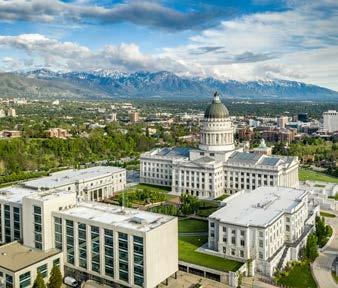
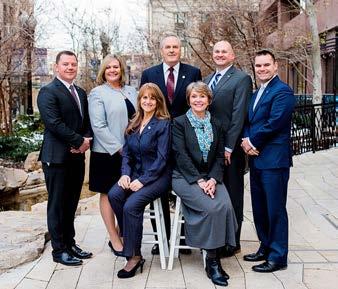
The Board of the Utah Governor’s Office of Economic Development consists of 15 members appointed to four-year terms by the governor with the advice and consent of the senate. No more than eight members are from one political party, and the membership represents all areas of the state.
The Board helps promote and encourage the economic, commercial, financial, industrial, agricultural and civic welfare of the state. The board also advises GOED staff on the development, attraction, retention and expansion of businesses, industries and commerce within the state.
Carine Clark, Chair Chair, Silicon Slopes Commons
Stefanie Bevans
CEO & Owner, Design to Print
Brad Bonham CEO, Walker Edison
Doug Dilley
General Manager Commercial Flight Controls Division, Parker Aerospace
Margaret Jacobs
Chairman, Sundance Institute
Susan Johnson
President, Futura Industries
Heather Kahlert
Executive Vice President, The Kahlert Foundation
Roger Killpack Owner, Service Drug
Mel Lavitt, Incentives Committee Chair
Senior Advisor, Needham & Company
Annette Meier
President and COO, Superior Drilling Products
Andrea Moss
President and CEO, Nelnet Bank
Peter Mouskondis
President and CEO, Nicholas & Co.
Steve Neeleman
Founder & Vice Chairman, HealthEquity
Jesse Turley
Managing Director, Bank of America Private Bank
Ted Wilson
Former UCAIR Executive Director, Former Salt Lake City Mayor

Carine Clark Chair, Silicon Slopes Commons carinestromclark@gmail.com 801-376-3060
For a decade, Forbes ranked Utah a top-three “Best State for Business,” including six times in the number one spot. The 2019 ranking is No. 3. The publication also named Utah the Best State for Entrepreneurs (Nov. 2019).
The Wall Street Journal named Utah “America’s economic star” in Dec. 2019.
SmartAsset named Utah the No. 1 State for the Middle Class (Nov. 2019).
In 2019, Inc. magazine named Utah the “the No. 2 best place in America to start a business.”
In a study published last December, FOX Business and The Heritage Foundation identified Utah as the state with the best economic outlook. Utah has held the No. 1 spot in this report since 2012.
U.S. News & World Report ranked Utah as the No. 2 best U.S. economy (May 2019).
In its Best-Performing Cities report, the Milken Institute ranked three Utah cities in the top 25: Provo-Orem: No. 1, Salt Lake City: No. 10, Ogden-Clearfield: No. 21 (Jan. 2019).
Also, in Chief Executive magazine’s 16th Annual CEO Survey of the Best and Worst States for Business, Utah placed No. 10; in the top 10 for the first time (June 2020).
Harper’s Bazaar named Utah one of the “10 travel destinations to visit in 2020.”
London-based travel publisher RoughGuides named Utah among the seven “best states to visit in the USA 2020.”
USA Today named the All-American Road: Scenic Byway 12 among its “10 best road trips in the USA.”
Salt Lake City made The Daily Meal’s “50 best foodie towns in America,” Travel Channel selected Park City among the “10 best small towns to visit this Christmas” and Bryce Canyon National Park headlined Travel + Leisure’s “best national parks to visit in winter.”
The Hospitality Sales & Marketing Association International (HSMAI) honored the Utah Office of Tourism with three Gold Adrian Awards for digital and integrated marketing excellence: The Voices of Bears Ears video series, a China Red Emerald high-impact travel initiative and the More Mountain Time® winter campaign. The Voices of Bears Ears also received a Mercury Award from the U.S. Travel Association.

Since March, GOED teams, like most of Utah’s government agencies and departments, have mobilized and contributed to the state’s COVID-19 pandemic response.
To date, GOED has managed over $115 million, including $86 million in federal CARES Act grants, delivering relief aid and services to Utahns, Utah businesses, and nonprofit organizations.
A few initiatives include:
• COVID-19 Employer Information Session
• Spearheading the effort to get Utah eligible for SBA relief funds
• Support of the Economic Response Task Force, including chairing the State/Local Resources Subcommittee
• Participating in the SBA loan rapid response team
• Leading the Utah Leads Together - Volume 4 effort
• Content lead for coronavirus.utah.gov/business
• Supporting procurement of PPE for essential workers
• Utah Leads Together Small Business Bridge Loan
• A Mask for Every Utahn initiative
• Securing COVID-19 testing swabs
• COVID-19 Commercial Rental Assistance Program
• Repurposing of BEAR grant funds
• Storytelling in GOED’s newsroom with pandemic stories and podcasts
• Preparing a statewide health and wellness, and economic reactivation communications campaign called ‘In Utah’
• Safe In Utah
• Shop In Utah
• Learn & Work In Utah
• A three-phase inspirational integrated marketing campaign for when people are ready to travel
• Customized customer service and resources for travel planners across communication channels and on visitutah.com
• Tourism Recovery Funds
In a time of economic crisis and uncertainty, the importance of GOED and its team cannot be overstated. As our Executive Director Val Hale likes to say, “Economic development is a journey, not a destination.” In March, all of the indepth, collaborative planning that took place in 2019 to update the state’s economic development strategic plan was overshadowed by the global coronavirus pandemic.
Utah now finds itself in uncharted territory. It’s critical the state act to protect the health of its citizens while encouraging economic opportunities that come from a vibrant, resilient and diverse economy. Utah needs smart, strategic economic growth. There is no better statewide entity or more qualified team to manage this growth and apply appropriate levers than GOED.
For the second half of 2020 and into 2021, the professional, engaged GOED team will continue to champion Utah as an ideal location for business, building on its existing high water mark of 13,364 new, high-paying jobs promised in the 2020 fiscal year. The team will focus on opportunities and challenges both along the Wasatch Front and in Utah’s rural communities. We will also continue to promote the state as an ideal destination for travel and film production.

Ben Hart
benhart@utah.gov
801-538-8799
The Corporate Recruitment, International Trade and Diplomacy, and Talent Ready Utah teams are critical programs within the Governor’s Office of Economic Development. These programs are the backbone of the state’s economic development policy, having delivered tens of thousands of jobs and strengthened critical industries across the state for decades. The teams work to improve businesses, generate job growth, align with foreign markets, and convene stakeholders to facilitate and foster a more robust labor force.

GOED’s Corporate Recruitment program accelerates Utah’s business growth and job creation through sustainable, cluster-organized, domestic and international corporate expansion and relocation. The EDTIF program, and other appropriate financial incentives, offer post-performance tax credits to qualifying, targeted businesses. These businesses only receive the credits after they create new, high-paying jobs that help improve the standard of living, increase the tax base, attract and retain top-level management, and diversify the state’s economy.
The Corporate Recruitment team works with a statewide nonprofit partner to attract new companies and industries to the state. The contract is with the Economic Development Corporation of Utah (EDCU). This partnership allows GOED to leverage state resources in combination with local and private dollars at a 2-to-1 match to enhance statewide economic development. EDCU assists the corporate recruitment team in building local and regional economies through proactive recruitment, site selection services, and local project management.
In FY20, more than 13,000 new jobs were announced, over $1.1 billion in capital investment, over $591 million in new state revenue, and more than $9.7 billion in new state wages. The 2020 fiscal year was a record year for Utah corporate recruitment, delivering the highest number of new, high-paying jobs in a fiscal year.

Thomas Wadsworth twadsworth@utah.gov
801-538-8625

Kimberlee Carlile kcarlile@utah.gov 801-538-8669
Talent Ready Utah plays a vital role in aligning the state’s education and workforce programs with industry needs. Workforce remains the highest need for businesses in the state. Talent Ready Utah helps companies to expand by facilitating the creation or expansion of training, workforce, certificate, and degree programs.
Talent Ready Utah began in 2016 when Boeing approached the state about implementing a short-term training program for the aerospace industry. The program, Utah Aerospace Pathways, has been replicated in additional sectors across the state. It is considered a national best practice and has been highlighted many times by the National Governors Association.
Talent Ready Utah oversees several programs and initiatives, including the Utah Works program, the Youth Apprenticeship program, the pathway programs, and others. Other initiatives such as the Computer Science for Utah, Utah Futures, and other statewide initiatives have been moved under the Talent Ready Utah umbrella.
The Talent Ready Utah Board consists of the highest-ranking officials from the following organizations: Utah System of Higher Education, Utah State Board of Education, and the Salt Lake Chamber, along with two legislators, four CEOs, and others.
Talent Ready Utah maintains several critical partnerships with Utah’s most significant employers, including Boeing, Northrop Grumman, Albany, Edwards Life Sciences, BD, Pluralsight, Domo, Instructure Komatsu, Cummins, Geneva, WW Clyde, and hundreds of others.
Talent Ready Utah has demonstrated Utah’s ability to help education become more innovative around apprenticeships and work-based learning, curriculum alignment and development, and assisting students in controlling their career planning better
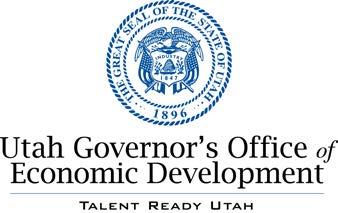
Director

Franz Kolb fkolb@utah.gov
801-538-8717
GOED’s International Trade and Diplomacy team provides international diplomatic support for the state’s governor and partners with World Trade Center Utah to assist Utah companies with global market development. In 2019, the team hosted 104 diplomatic visits from ambassadors and other high-level diplomats.
As GOED launched initiatives to meet COVID-19’s economic impact, the Talent Ready Utah team supported the Utah Leads Together Small Business Bridge Loan program, by participating in loan application evaluations.
Additionally, team members supported the “A Mask for Every Utahn” initiative, assisting with customer service and strategizing with Utah State Mail & Distribution Services on processes to validate addresses for all orders placed and fixing incorrect orders. The corporate recruitment team also played critical roles in securing necessary supplies for testing and PPE during the past few months.
The closure of schools directly impacted Talent Ready Utah programs involving students at the secondary and post-secondary levels. In response to these closures, Talent Ready Utah programs were altered to continue to meet industry and education needs by moving activities online, such as annual graduation events and working committee meetings. As coursework was made available online for secondary and post-secondary students, various secondary partnerships restructured courses to manage smaller cohorts of students to provide hands-on learning in the classroom to support program completion for various pathways programs, Utah Works and TRAC youth apprenticeships.
The international team has been critical during the pandemic response. Franz Kolb has helped numerous Utah citizens return home from abroad, coordinate shipments through customers, secure PPE, and other necessary duties that have contributed to keeping Utahn’s safe.
Securing a mask for every Utahn continues to be crucial to ensure our economy can adapt to the new normal while protecting our citizens. The state of Utah, through an arrangement with the Utah Manufacturers Association, Cotopaxi, and HM Cole purchased 2.3 million face masks to help protect the health of Utahns during the global COVID-19 pandemic. The state’s order for masks helped to save more than 300 jobs by keeping Utah manufacturers open.
At the launch of this program, the demand was so high that initial ordering crashed the site for 8 hours. GOED worked to make 2.3 million masks available, attracting the attention of CNN who picked up the story for a nationwide broadcast.

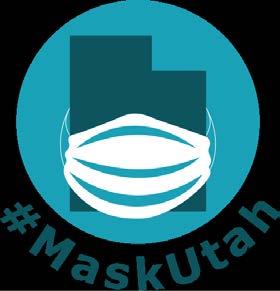
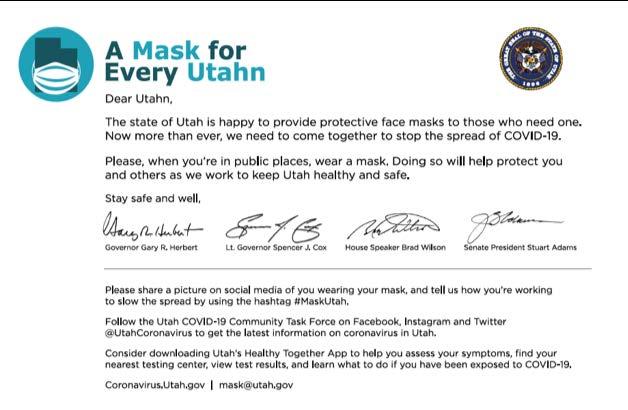
The business intelligence team played a crucial role in developing an order tracking system while the compliance team secured an exception that allowed the mask fulfillment center to achieve their goals on time. Compliance was also able to utilize regular and emergency purchasing guidelines for a state leadership insert for each mask request. Additionally, GOED provided staffing to support the customer service demands in getting masks to Utah citizens.
The ‘A Mask for Every Utahn’ project fulfilled nearly 1.24 million masks requests, from almost 280,000 household orders. The program also provided masks to all K-12 school children, teachers and faculty in the state, which amounted to approximately 750,000 masks. The program also sent 140,000 masks to grocery stores, particularly those in underserved areas and those who have had more COVID-19 cases. The rest of the mask requests, and those that the program is working to procure, will go to underserved and vulnerable populations throughout the state.
The Learn & Work In Utah education program encourages career development and workforce engagement for citizens recently displaced by the COVID-19 pandemic.
The Utah Legislature allocated federal CARES Act funds for the campaign and assigned the initiative to the Utah Governor’s Office of Economic Development (Talent Ready Utah) as well as the Utah System of Higher Education, with support from the Department of Workforce Services.
The Talent Ready Utah and Utah System of Higher Education teams are working with higher education and technical college partners to stand-up and promote the newly established workforce development programs statewide.
As business needs evolve, the state’s economic development strategy must change as well. EDTIF, for example, has been the state’s primary economic incentive for corporate recruitment. However, several updates have been discussed over the last few years, with no changes made to the program yet.
The EDTIF program must continue to help accomplish the economic needs of the day. We need to target critical supply chain partners for our Utah businesses. EDTIF amounts offered also need to be responsive to the economic times. We need to ensure that EDTIF remains effective in helping the state achieve its long-term economic growth goals. This program is well-positioned to maintain itself as Utah’s key economic development incentive.
Talent Ready Utah is becoming one of the most critical education entities in the state. However, it has just scratched the surface of education alignment. Talent Ready Utah is well-positioned to bridge education and industry gaps now and in the future.

 Ryan Starks ryanstarks@utah.gov
Ryan Starks ryanstarks@utah.gov
801-538-8794
Through partnerships with the private sector, statewide economic development organizations, and other state and federal agencies, the Business Services team helps companies and industries seeking to expand, relocate, partner and innovate in Utah.
GOED has identified seven strategic, targeted industries on which to focus economic development efforts. They are:
1. Aerospace and Defense
2. Advanced Manufacturing
3. Energy
4. Financial Services
5. Life Sciences and Healthcare
6. Outdoor Products and Recreation
7. Software and Information Technology
The Business Services team helps facilitate growth within five of the seven targeted industries, excluding energy, which receives its focus through the Governor’s Office of Energy Development, and outdoor products and recreation, supported by the Utah Office of Outdoor Recreation.
The Business Services team also manages several different programs:
The Federal Opportunity Zones Program is an innovative reinvestment system established through the Tax Cuts and Jobs Act of 2017. Through temporarily deferring taxes on capital gains reinvested into designated Opportunity Funds, researchers estimate that the program may infuse rural and underserved markets with an estimated $6.1 trillion.
There are 46 Utah Opportunity Zones, which provide investors with endless potential to generate lasting community impact while earning significant returns. GOED believes Opportunity Zones will catalyze substantive growth in 13 rural Utah counties.
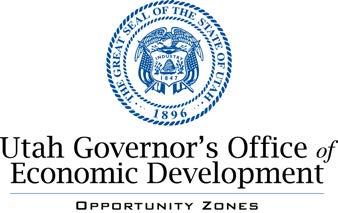
Director

Chuck Spence cspence@utah.gov 801-538-8655
Procurement Technical Assistance Centers (PTACs) help Utah’s small businesses identify, pursue and win government contracts to grow their operations and successfully compete in the local and global government marketplace. Through one-on-one and group counseling, PTAC educates and assists Utah businesses in competing more effectively in the government marketplace.
PTAC provides a bid-matching service to help businesses identify relevant contracting opportunities and then offers technical assistance on many aspects of the government contracting process, including, but not limited to, business-to-government marketing, diversity program eligibility, and solicitation response document review. PTAC also assists Utah contractors, vendors and suppliers with other aspects of the procurement process, including government contracting readiness assessment, GSA assistance, and registration for government contracting set-aside programs.
The Office of Rural Development (ORD) works with businesses in Utah’s rural counties, providing resources and programs to sustain business and improve employment opportunities. The office collaborates with local governments and other development partners to support rural economic growth.
ORD oversees six programs, including:
1. Enterprise Zone Tax Credits — Provides tax credits to businesses to expand operations and create new jobs in rural Utah.
2. Rural County Grant Program — Provides up to $200,000 to rural counties to address economic development needs.
3. Rural Coworking and Innovation Center Grant — Creates coworking hubs that provide individuals in rural communities with infrastructure and equipment to participate in the online workforce.
4. Rural Economic Development Incentive — A post-performance grant that incentivizes businesses to create new, high-paying jobs remotely, online, in a satellite hub, or physically located in qualifying rural Utah counties.
5. Targeted Business Tax Credits — Provides tax credits to businesses that make significant capital investments and create a sizable number of new jobs.
6. Utah Rural Jobs Program — Provides small rural Utah businesses with capital funds to expand and create new jobs.
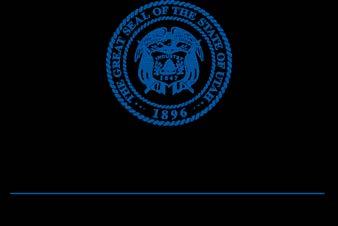
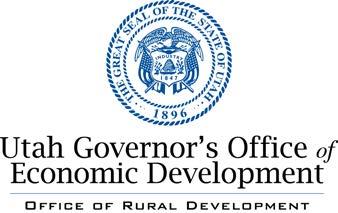
Director

Mary Cardon mcardon@utah.gov 801-957-5249
GOED works with broadband providers, local, state and federal policymakers, consumers, community institutions and other stakeholders to support broadband deployment throughout the state. This collaborative partnership encourages stakeholders to improve efficiencies and expand statewide access and usage.
The state endorses a broadband plan to increase deployment, bandwidth, adoption, digital inclusion and literacy across the state to businesses, educational anchor institutions, libraries, healthcare centers, tribes and other entities.
In 2019 GOED supported three rural broadband providers with research and endorsements, and these entities were awarded nearly $30 million in USDA ReConnect grants. These grants will increase rural broadband coverage. Business Services team members also collaborate on federal and national broadband issues and legislation.
Broadband in Utah is crucial to the state’s economy and connection to the world.
The Utah Main Street Pilot program is a collaborative partnership between state agencies, other organizations and Brigham City and Price’s pilot communities to assist in revitalizing their historic downtown districts.
With practical and usable tools and resources provided by partners, the community-led Main Street Pilot program addresses the needs and wants of the community and will lead to a roll-out of the Utah Main Street Program in communities throughout the state.
The Main Street America approach is a unique preservation-based economic development tool that enables communities to revitalize downtown and neighborhood business districts by leveraging local assets from historical, cultural and architectural resources. This comprehensive strategy addresses a variety of issues that challenge traditional commercial districts.
The pilot committee procured funding commitments and is the recipient of a USDA Rural Business Development Grant. This funding is used to support training and technical assistance, feasibility studies and business plans, city beautification and a variety of other activities.
The Utah Industry and Innovation Center facilitates the growth of Utah’s targeted industries by assisting with corporate recruitment, workforce development, and strategic partnerships. Additionally, the Center helps small businesses from all targeted industries apply for federal Small Business Research (SBIR) and Small Business Technology Transfer (STTR) funding programs.
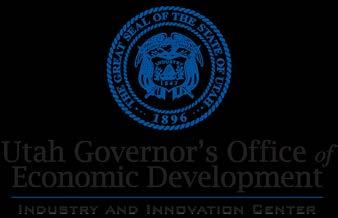
The Center fosters innovation, including research and development of new technology, and helps Utah technology-oriented companies secure nondilutive funding in the form of both grants and contracts.
In the past fiscal year, the Business Services team’s rural programs achieved 20 Rural Fast Track Grant applications and funding of $925,561, supporting 37 new jobs and spurring $5,639,912 in estimated private capital expenditures.
The Business Expansion and Retention (BEAR) grant also funded 20 projects with funding of $948,131. The rural team made over 800 visits to Utah’s rural counties delivering 78 training seminars and workshops benefiting more than 2,300 participants. Also, 21 community planning and special projects were funded with $275,900. This spring, the BEAR grant was repurposed for COVID-19 relief totaling $297,000 in rural Utah.
The fiscal year’s Enterprise Zone Tax Credits program resulted in:
• 1,234 tax credit claims
• $14,273,305 tax credits issued
• $192,121,386 private capital investment
• 10 new job tax credit claims
• $102, 705 in new job tax credits issued, and 107 new rural jobs created
The Rural Coworking and Innovation Center issued four grants totaling $500,000 to complete six separate projects.
The rural team provided two refundable tax credits as part of its Targeted Business Tax Credit initiative, with $200,000 in refundable tax credits to be issued upon project completion.
Finally, the Rural Economic Development Incentive Grant issued $56,000, resulting in 10 new, high-paying rural jobs.
The newly named Utah Industry and Innovation Center, formerly the SBIR Center, approved 20 applications resulting in $7,715,841 in non-dilutive funding to advance research and development for Utah companies. The team held 20 events with 586 participants.
The Procurement Technical Assistance Center’s fiscal year programs included:
• 2,937 counseling hours spent with 927 active clients throughout Utah (612 new clients)
• 57 events
• 4,235 prime federal contracts awarded totaling $711,327,232 resulting in 15,115 Utah jobs created or retained
• 154 prime state or local contracts awarded totaling $13,364,879 resulting in 284 Utah jobs created or retained
• 408 subcontract awards totaling $562,671,135 resulting in 11,956 Utah jobs created or retained
The Business Services’ robust response to the coronavirus pandemic included several targeted measures to directly address the health crisis. A sampling of measures taken include:
• Facilitated a letter from the Governor’s Office to help Utah businesses become eligible for U.S. Small Business Administration funds.
• Participated in numerous webinars and virtual presentations to educate businesses on how to apply for Small Business Administration funding.
• Participated in various television interviews to discuss business assistance programs.
• Reviewed hundreds of Utah Leads Together Small Business Bridge Loan applications for completeness and compliance.
• Worked on the “A Mask for Every Utahn” campaign, verifying thousands of addresses submitted for mask orders, responding to hundreds of emails inquiring about mask orders and tracking orders that needed to be resent, to determine if there are clusters of areas where masks aren’t being delivered, in addition to many more tasks that kept Utahns safe.
The Utah Industry and Innovation Center team answered questions about COVID-19 related technologies requests from the National Science Foundation from small businesses in the state. Additionally, the ORD team instigated changes to the BEAR program and created the BEAR Sub-Grant Program for COVID-19 relief. Finally, PTAC was designated as an “essential business” by the Department of Defense, and assisted clients at GOED offices or business locations.
Chaired by World Trade Center Utah, the SBA Rapid Response Team helped businesses navigate and obtain federal, state, and local funding resources. This team was crucial at ensuring Utah’s small businesses were successful in securing the most PPP in the country. GOED provided staffing for the specialized taskforce, the SBA Rapid Response Team, to help constituents understand and track resources at the federal level.
The Business Expansion and Retention (BEAR) grant is administered by the Utah Governor’s Office of Economic Development. BEAR funds are used for economic development projects within Utah counties. These projects typically include sector business analysis, economic development planning, implementation of planning outcomes, training and other projects enhancing rural economies.
Understanding the unprecedented challenges brought on by the COVID-19 pandemic and the need to respond quickly and effectively, GOED made it possible for BEAR grant recipients to repurpose funds to help local businesses. At the county’s discretion, BEAR grant funds may now be used for utilities, rent, payroll, payroll taxes, or employee health benefits, providing businesses with the flexibility and funds they need to weather this global challenge.
Under this response, GOED’s contract team We amended 18/20 FY20 BEAR grant contracts, completed in late April. The purpose was to allow the grantees to issue “sub-grants” of up to $1,000 to small businesses in their geographic areas during the last three months of the contract terms and to allow those sub-grants to be eligible for reimbursable expenses through the BEAR contracts.
GOED is committed to supporting business expansion and retention throughout Utah. The Business Services team will continue to work closely with other business service providers, including the Small Business Development Centers, to provide training opportunities to Utah businesses. Our PTAC will continue to provide technical expertise and resources to thousands of businesses interested in contracting with the federal government.
ORD staff members will closely coordinate with rural economic development directors and county commissioners to provide support through the Rural County Grant program. Additionally, the rural team will continue its outreach to counties and businesses to provide information on other state grants and tax credit programs. Utah’s opportunity zones will continue to be promoted as a way to attract new capital to rural areas of the state.
The Utah Industry and Innovation Center will foster meaningful discussions and growth strategies within the state’s targeted industries, while also providing educational opportunities for businesses through workshops, webinars and conferences, as well as other targeted outreach activities.

 Vicki Varela vvarela@utah.gov
Vicki Varela vvarela@utah.gov
801-538-1369
The Utah Office of Tourism (UOT) elevates life in Utah through responsible tourism stewardship. We achieve our mission through:
• Marketing: We curate messaging that inspires visitation, supports local businesses and builds the Utah economy.
• Stewardship: We distribute visitation statewide and promote the responsible discovery of Utah.
• Development: We partner with local communities to enhance and develop their visitor economies to benefit residents and visitors.
The office generates significant traveler spending and tax revenues. It manages domestic and international marketing and communication strategies to inspire visitation and assist prospective visitors in travel planning. It also collaborates with local organizations to develop tourism destinations and marketing campaigns.
Red Emerald Strategic Plan — Just like the red emerald, mined only in Utah, visiting our state should be a unique, transformational experience that can’t be found elsewhere. The strategic plan creates a lasting and sustainable tourism economy by attracting well-informed, high-value customers from around the world who are distributed throughout the state, stay longer, spend more, responsibly get off the beaten path and engage deeply with local communities.
Precision Marketing — Utah leads the nation in targeting the right message to the right visitor. New analytics capabilities allow for improved tracking and insight to gauge the economic impact of ad spending. The team uses machine learning and artificial intelligence to optimize cross-channel marketing campaigns, improve customer service, and model semantic data to match content to user intent.
Community Relations and Destination Development — UOT works with local community leaders to integrate tourism development into local economic development plans, identifying key strengths and unique offerings for marketing programs, and facilitating productive dialogue among community stakeholders.
Visitors spent $10.06 billion in Utah last year, generating $1.3 billion in tax revenues. This spending generates approximately $1,305 in annual tax relief for every Utah household.
UOT is the first destination marketing organization to leverage Arrivalist data to track visitation prompted by exposure to traditional TV advertising, increasing our understanding of ad efficacy.
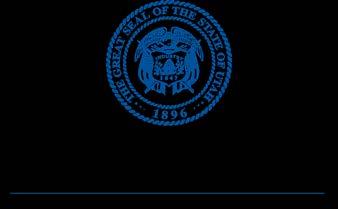
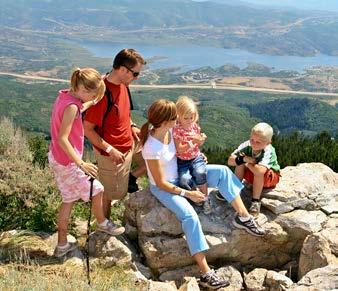
Lance Syrett, Board Chair
Board Chair, Represents: Lodging Industry
Nathan Rafferty, Board Vice Chair
Chair, Represents: Ski Industry
Kym Buttschardt
Represents: Davis, Weber, Box Elder, Cache, Rich Counties
Dirk Clayson
Represents: San Juan, Piute, Wayne, Garfield, and Kane Counties
Dean Cox
Represents: Utah Association of Counties
Elaine Gizler
Represents: Carbon, Emery, Grand, Duschesne, Daggett, Uintah Counties
Brian Merrill
Represents: Business Owners
Greg Miller
Represents: Salt Lake, Tooele, Morgan Counties
Glen Overton
Represents: Restaurant Industry
Mike Taylor
Represents: Motor Vehicle Rental Industry
Sara Toliver
Represents: Utah Tourism Industry Association
Shayne Wittwer
Represents: Washington, Iron, Beaver, Sanpete, Sevier, Millard Counties
Working with its creative agency Struck, the UOT launched an interagency response to the COVID-19 pandemic anchored in a three-phase industry recovery strategy called Renaissance. The campaign targeted Utahns and regional drive markets (“travelers in waiting”) with inspirational advertising alongside a robust social media, public relations and content marketing effort to keep Utah travel inspiration front-ofmind. The integrated campaign promoted access to wide-open outdoors, support for local business, wellness and responsible, safe travel.
Early in the pandemic, the UOT paused most, but not all, of its marketing. By maintaining a modest presence on TripAdvisor, visitutah.com received stronger recovery signals in ad exposed page views as well as overall website visits and faster recovery than competitor states of hotel searches across online travel agencies. Meanwhile, the UOT supported access to state and federal funding, facilitated short- and long-term travel planning by improving its Intercom online chat resource, and provided timely resources for the industry and consumers on travel.utah.gov and visitutah.com. To date, visitutah.com’s COVID-19 responsible travel page has received nearly 150,000 unique pageviews.
To inform its marketing, the UOT and partner Love Communications closely monitored traveler and resident sentiment and extensive third-party research from leading travel advisors. The UOT will move to the final phase of its strategy at the convergence of consumer readiness, community readiness and a flattening of the COVID-19 curve.

Lance Syrett Board Chair lance@rubysinn.com 435-834-8022
The UOT also assisted with the interagency response to the Pandemic in other ways. The managing director serves on the COVID-19 Response Task Force. Two other staff members attend State and Local resource subcommittee meetings. A staff member assisted in answering questions about SBA loans. Another staff member was on stand-by to assist the health department make phone calls to those who may have been infected by the virus. Multiple staff members assisted in the preparation of masks for distribution, and the office helped arrange for 500,000 masks to be distributed to tourism destinations around the state.
The office is organizing key CARES initiatives to help businesses survive. The office is also providing matching funds for in-state marketing for the first time through its cooperative marketing program to help cities, counties, and nonprofit organizations attract in-state residents as the economy begins to open up.
The Mighty 5® and The Greatest Snow on Earth® remain at the core of our storytelling. Through industry leadership, innovations in marketing, strong connections with high-value target audiences and major improvements to the visitor experience at visitutah.com, future campaigns will work even harder for our travelers wherever they are in their travel journey, from inspiration to booking to more thoughtful engagement in Utah as a destination. Continued powerful branding is a key imperative of the Red Emerald Strategic Plan that increases awareness and improves positive social sentiment. Our marketing, stewardship and destination management work not only attracts new and return travel, but cultivates advocates and ambassadors for Utah locally and around the world.
While international travel is expected to recover slower than domestic, the UOT will maintain awareness campaigns in our key global markets to sustain interest in advance travel planning. Through its Forever Mighty™ initiative, the UOT will leverage global sustainable travel interest to become recognized leaders in responsible travel education and messaging in ways that resonate with residents and cultivate well-prepared visitors who demonstrate an interest in supporting local business, deeper regional travel, and respect for our cherished natural places.
To best prepare our communities for travel demand, the UOT will engage the industry in developing visitor readiness at scales commensurate with their community needs and interests. To achieve the objectives of this strategic imperative, the UOT will need to allocate resources to additional staff dedicated to destination development and management initiatives ranging from education and training to programming and resources.

Director
 Pitt Grewe
Pitt Grewe
pgrewe@utah.gov
801-538-8674
The Utah Office of Outdoor Recreation (OOR) supports communities throughout the state by researching and recommending policies that enhance recreation. The office also promotes corporate recruitment for Utah’s $12.3 billion outdoor industry and inspires Utahns to get outside through initiatives like “Every Kid Outdoors.” Through funding provided by the Utah Legislature, the Outdoor team administers the Utah Outdoor Recreation Grant, which helps build recreation infrastructure for residents and visitors to enjoy.
Utah’s outdoor recreation impacts include:
• $12.3 billion in consumer spending
• 110,000 direct jobs
• $3.9 billion in wages and salaries
• $737 million in state and local tax revenue
• 72% of Utahns recreating each year
The Utah Outdoor Recreation Grant supports outdoor recreation by providing matching funds for new trails, bike parks, boat ramps, shooting ranges and more. Investing in outdoor recreation infrastructure helps local communities achieve economic development and tourism goals.
Since its inception in 2015, the impact of these grants include:
• 213 projects awarded
• 550+ jobs created
• 61% of project funding in rural Utah
• 7:1 private-to-public leverage
• Over $16 million awarded with a project value of $121 million
The Utah Outdoor Recreation Summit is typically an annual three-day conference held at locations throughout the state. Participants enjoy outdoor activities, educational workshops and inspiring speakers. Attendees also have networking opportunities to engage with local stakeholders, industry professionals and land managers that play a role in Utah’s outdoor recreation community.
The Outdoor team is excited to host a hybrid one-day Summit in 2020, with both inperson and virtual experiences. Keynote speakers will be live-streamed and much of the content will be pre-recorded, allowing for expanded content and a farther reach to share Utah’s outdoor recreation message and best practices.
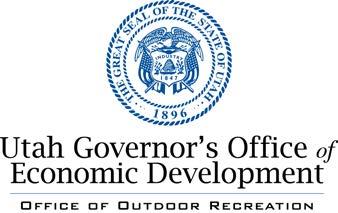
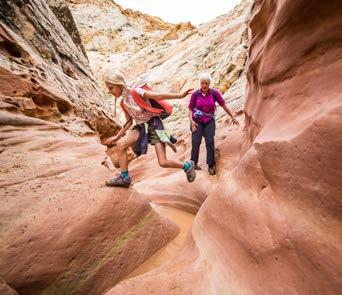
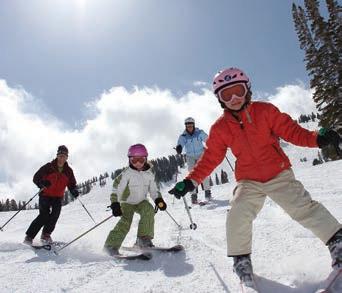
• Essential Businesses - Bike Shops
° OOR worked with local bike shops across the state to support their inclusion in the essential business list during the red COVID-19 response phase.
• COVID-19 and Outdoor Business Resources
° OOR has continued to compile a list of resources for outdoor businesses on its website.
• Utah Leads Together
° OOR promoted and helped process applications for both rounds of the Utah Leads Together Small Business Bridge Loan program. It was also the main focus of a recent Summit Speaker Series webinar.
• Commercial Rental Assistance Program
° OOR continues to promote the Commercial Assistance Program, encouraging local retailers to apply.
• Virtual Summit Speaker Series
° We transitioned our speaker series from an in-person to a virtual format, focusing content on COVID-19 related topics benefitting local businesses, nonprofits and community members.
• Produced an infographic (with GOED marcom) about social distancing in the outdoors and promoted it throughout our social media channels.
• Shifted the grant application deadline two weeks later to help applicants have more time to fill out the application and get partner, etc., support letters
° Because of the pandemic, this extension was needed and wellreceived, allowing a significant number of applicants the necessary time to complete and submit their applications.
• Virtual Scoring Meetings



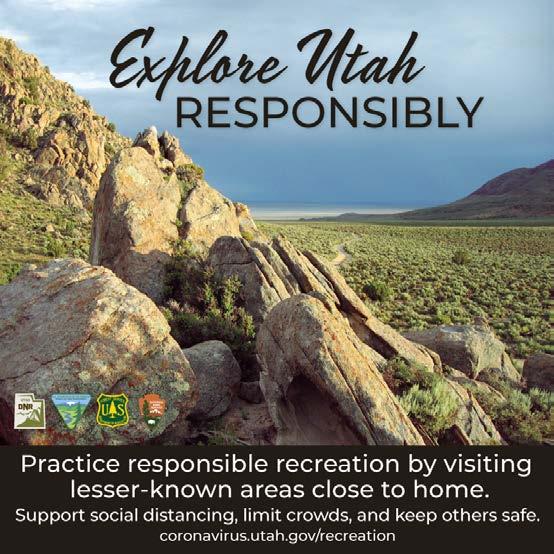
° Both UCORE and UORG scoring meetings were held virtually.
• Promoting Utah Outdoor Businesses’ responses
° OOR has continued to promote the inspiring responses of our local outdoor businesses in our social media and newsletter, while also including several local business owners in our Summit Speaker Series webinars.
• Compiling an ongoing list of help for businesses and ideas for families and kids of what to do during quarantine (see here) and working with GOED’s marcom team manage social media engagement
The Utah Office of Outdoor Recreation’s goal is to help provide a healthy and leading business environment for Utah’s outdoor recreation startups and businesses. We aim to nurture innovation, support small businesses, and encourage relocation and the establishment of outdoor companies. This is done by improving Utah’s public land policy and use reputation in the industry.
OOR looks to instill the idea of outdoor recreation being in every Utahn’s backyard. With the number of public lands and steadily increasing outdoor infrastructure, most Utahn can access outdoor recreation within 10 minutes of their home. We want to get leaders, developers, and residents on board to help establish our communities with a focus on outdoor recreation.
Because of the state’s first-to-market position, OOR will continue its leadership role for all state offices of outdoor recreation nationwide. Many states continue to look at what Utah is doing in outdoor recreation. We want to continue to be that inspirational trailblazer.
OOR looks to create a resource platform that can be used by other states that are developing policies, plans, and suggestions for outdoor recreation. This is an expansion of our successful Utah Outdoor Recreation Summit and Speaker Series. It gives access to more people nationwide and helps them see how Utah has fostered and succeeded in outdoor recreation.
OOR would like to expand the UCORE grant program. The funding of youth programs is a top priority. One of the office’s main goals is to get more kids outside and engaged with the outdoors. As technology and gadgets become even more pervasive in our culture, getting children outdoors is more important every year


Director

Virginia Pearce vpearce@utah.gov
801-538-8740
The Utah Film Commission was established in 1974 to support the rich legacy of filmmaking across the state. The office markets the entire state as a destination for film, TV and commercial production by promoting the use of professional local crew and talent, support services, locations, and state incentives in collaboration with regional stakeholders.
The office also serves as liaison to the broader entertainment industry by supporting local film organizations and events, most notably the annual Sundance Film Festival, and facilitating production needs across the state. With more than 1,500 productions created in-state, Utah has an undeniably deep and lasting commitment to the entertainment industry. It includes iconic films such as Butch Cassidy and The Sundance Kid, Thelma & Louise, Easy Rider, and Forrest Gump
To encourage growth, Utah Film Commission utilizes the Motion Picture Incentive Program (MPIP). Per statute, the key objectives of the MPIP are to encourage the use of in-state locations, crew and resources, and to provide incentives to compete with other states and develop a strong motion picture industry presence in the state. The program receives ongoing annual funds of $1.5 million in cash and $6.79 million in tax credits. The MPIP offers a 20-25% tax credit or cash rebate for productions that meet specific criteria including the strength of the production company, quality and suitability of project, economic benefit, and number of jobs created.
• Since Utah’s current film incentive program (MPIP) began in FY 2012, $378 million has been spent in-state by studios such as Fox, AMC, Disney, HBO and ABC.
• 23 productions received state film incentives to shoot in Utah in 2019, including a mix of local and out of state feature films, TV series, and documentaries.
• 900+ film permits were approved across the state (54% of film permits occur in rural Utah).
• In 2019, productions that received an incentive spent a total of $59 million in state, of which $14.6 million was spent in rural Utah.
• A variety of feature films and television series filmed in-state in 2019, including productions from BYU TV, Paramount Network, Quibi, Hallmark Channel, CW, and Disney, along with many other short films and commercials.
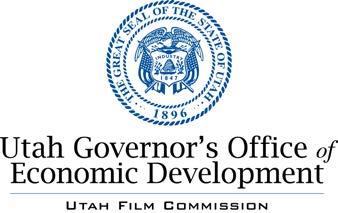

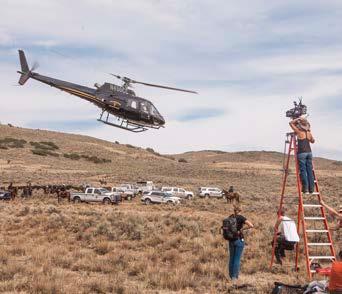
The Utah Film Commission monitored the pandemic with a focus on the health and safety of Utah communities. To better protect the public and Utah Film Commission staff from the spread of COVID-19, our offices at Council Hall closed to the public, effective March 16, 2020, while the film team remained available to respond to all requests for information via telework.
When the state began suspending business operations to limit the spread of COVID-19, the Utah Film Commission worked with producers that were forced to halt production in Utah, created a list of resources, and provided consultation to Utah employees and businesses in the film industry. As Utah began to reopen in May 2020, we worked with state, local and industry task forces to develop recommendations to give our film industry a starting point for getting back to work.

There are 13 public and private Utah universities that offer some kind of film and digital entertainment program, with nearly 4,000 students currently enrolled. The Film Commission has created many workforce development programs that create a school-to-industry pipeline and provide trained crew for incoming productions.
Utah continues to grow as a hub for television and feature film production, as evidenced by the growth in both overall industry annual wages and the size and quality of productions that choose our state as a location. Increased interest in Utah as a filming destination over the past three years has meant that resources such as crew, infrastructure and incentives are often in short supply. Now that demand exceeds supply, we will continue working to determine the best, most sustainable approach to the incentive program and ensure a balance between out-of-state and local productions that utilize the state’s film incentive.
Even in these unprecedented times, film production remains a reliable economic driver that can impact both the Wasatch Front and rural Utah. Our office is adapting our resources to meet new challenges brought on by the pandemic. This includes moving workforce development online, providing virtual location scouts, and consultation to productions that are navigating new filming restrictions. These tactics will allow us to continue to provide services to the film industry and promote Utah as America’s film set.

Director
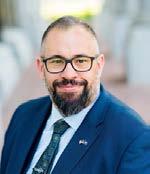
Scott Bowler
sbowler@utah.gov 801-538-8607
The Pete Suazo Utah Athletic Commission (PSUAC) provides a safe, healthy environment for combat sports in Utah.
The Pete Suazo Athletic Commission is named after the late Utah State Senator Eliud “Pete” Suazo. Pete Suazo was an advocate for youth and minorities, and a boxing enthusiast. He was integral to establishing Utah’s “Unified Rules of Boxing,” as set forth by the Association of Boxing Commissions.
The commission regulates professional and amateur unarmed combat sports in Utah, including kickboxing, mixed martial arts, and professional boxing. Under the Utah Professional Athletic Commission Act, promoters, managers, contestants, seconds, referees and judges must be licensed by the commission.
Regulation of unarmed combat includes maintaining medical clearances for athletes to ensure the safety and integrity of each respective sport. Implementation and enforcement of administrative rules provide a stable and fair environment for both the athletes and the public. The commission adheres to the national standards set forth by the Association of Boxing Commissions.
Fees generated help offset the cost of regulating unarmed sports in Utah.
In the first two quarters of the 2020 fiscal year, the PSUAC was on track to regulate the most events in seven years. Legacy Fighting Alliance (a nationally televised Mixed Martial Arts promotion) started with two hugely successful events, and a third was scheduled for May. Fierce Fighting Championships (an event based in Price, Utah) made a huge leap by moving from Price to the Maverik Center in West Valley City with their biggest show yet. DiBella Boxing Promotions (New York-based promotion) held is inaugural Utah event at the Salt Palace in Salt Lake City, which featured several undefeated athletes and two World Title bo=uts. All indications are that Utah is officially on the map with the more significant promotions and a destination for future events.
The Pete Suazo Utah Athletic Commission has detailed combat sports event procedures for each phase of the Utah Leads Together plan. The procedures address social distancing, COVID-19 advance screening for athletes and event personnel, PPE, and cleaning at the hotels and event locations.
PSUAC will continue building on the momentum of 2020 by focusing on developing programs that incentivize promoters to bring events to Utah, as well as providing support to existing promotions to help make them more financially solvent.
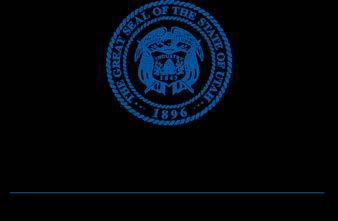


• Actively pursue ongoing training and updated technology to ensure an efficient and effective administration of competition rules.
• Increase efforts to establish new promotions, and to assist existing promotions to develop business strategies that ensure success.
• Develop a new, efficient online licensing program for athletes, promoters and officials. An online system could reduce the time commitment and workload of PSUAC by as much as 25% to 30%.
Events in the state of Utah are booked at the will of promoters. We will focus on educating non-Utah promoters about the social and economic advantages of conducting business in Utah.

 Kori Ann Edwards kaedwards@utah.gov
Kori Ann Edwards kaedwards@utah.gov
801-538-8623
The GOED operations team oversees finance, compliance, policy, business intelligence, contract management, human resources, technology services, and overall facility management.
The team is delivery-focused, ensuring organizational success through efficiency measures and careful consideration of all resources. Recognizing its stewardship of GOED’s accounting, work environment and human resources, the team strives to deliver innovative and thoughtful service through continuous quality improvement.
Throughout the pandemic, GOED’s operations team has played a vital role in creating an efficient teleworking environment designed to support and enhance the agency’s critical work. The operations team has developed, implemented and executed over $86 million in business relief assistance designed to aid in Utah’s economic recovery. The team plays an essential role in providing a holistic and unified approach to confront the challenges posed by COVID-19.
Moreover, the operation’s team ensures GOED remains open for regular business. To enhance program development and execution, the team created a new onboarding process to provide all COVID-19 programs GOED manages with consistent systems and methods. The new process has reduced program startup time, enhanced performance metrics and measurements, and improved customer integration and reporting.
The operations team is a ‘best in class’ cohort. Its members have government and management experience, knowledge, and a history of innovation. The team has institutionalized and maintained operations support for more than 50 active programs.
The operations team serves as the agency’s backbone, upholding all applicable federal and state laws, regulations and agency rules, standards, and guidelines. This essential function protects the integrity of both the organization and the taxpayer
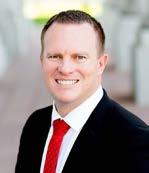
Kamron Dalton kdalton@utah.gov 801-538-8677
The finance team directs GOED’s fiscal activities, including advising executive, division, and agency directors on budgetary operations, and developing procedures and controls. The team reviews the formulation of GOED’s appropriation and division budget requests while analyzing program needs and revenue sources.
The team manages the allocation of federal, state or other grants, evaluates and applies executive and legislative guidelines for agency budget preparation, and assists department executive staff by providing detailed financial analysis.
The finance team develops solutions to financial problems and alternatives to minimize the impact of revenue cutbacks and shortfalls while interpreting state and federal guidelines for agency staff. It works with and provides reports to agency management, the governor’s office, the Legislature, and the federal government on agency fiscal activity. The team is involved in almost every aspect of GOED business and operations from beginning to end.
In addition to GOED, the team also provides financial support and services for partner entities, including the Governor’s Office of Energy Development, the Utah Inland Port Authority, the Point of the Mountain State Land Authority, and the Department of Heritage and Arts.
GOED’s four-member finance team has combined experience of over 50 years in accounting and state government. The team has a deep knowledge base and is a collective subject matter expert not only in purchasing and payment processing, but also in budgeting, financial compliance, internal controls, contracting, state, national and international travel, administrative procedures, auditing, legislative tracking, and federal grants, and general research. Each team member is cross-trained to perform all duties of the division as needed, ensuring continuity of service for all areas of responsibility.
During FY20, the team developed an agency-wide budget forecasting tool, employing both qualitative and quantitative methodologies. The new tool allows for interfacing with state systems to gather, organize, and present financial data to non-financial managers. The forecasted information is reviewed monthly with program managers to provide immediate financial information for program execution and fiscal management.
Under key performance indicators, the finance team processes 95% of all payment requests from receipt to issuance in under five days, averaging 3.4 days to pay
Utilizing their institutional knowledge, GOED’s finance team worked with State Finance to improve process-related shortcomings in FINET, the state financial system. Improvements included:
° Ability to pay multiple vendors on the same day
° Input efficiencies through the agencies vs. system developers
This foresight allowed various state agencies to use the system in FY20 when the COVID-19 pandemic hit. There was an immediate need to issue millions of dollars to Utah businesses as part of the federal CARES act funding.
 Jim Grover jimgrover@utah.gov
Jim Grover jimgrover@utah.gov
801-538-8860
Compliance provides assurances to stakeholders that contractual and legal requirements have been met before a company receives a tax certificate or grant payment. These services benefit GOED and the taxpayer by accurately and quickly assessing, documenting, and reporting outcome metrics such as new high-paying jobs or increased capital investment.
Compliance tests and ensures adequate internal controls to increase accountability for GOED programs. Documentation gathered and tested during the compliance assessment provides reliable, sought-after information, valued to determine and defend a program’s effectiveness.
The team operates with 51 years of combined training and experience directly related to accounting and assurance services in the private and government sectors. Members of the compliance team are cross-trained to fill-in any gaps or step into additional roles as needed.
The team oversees seven tax credit programs, which can be qualified for an application process, board review, and approximately eight cash incentive programs.
One notable program GOED received in 2017 is the Enterprise Zone Tax Credit Program. It provides a 10% and 5% tax credit to rural Utah companies for new capital investment in a designated rural Enterprise Zone. In FY18, the compliance team used tools from the Theory of Constraints to refine the process and move from a paperbased process to an automated digital workflow using Salesforce. This streamlined system allowed us to absorb the program’s wave of demand in the years to follow.
Here are the operational metrics that track the tax credits processed for the Enterprise Zone Program for the following years:
° FY2020 - 1,100 tax credits totaling $11.3 Million (estimate)
° FY2019 - 1,017 tax credits totaling $10.7 Million
° FY2018 - 727 tax credits totaling $8.5 Million
° FY2017 - 302 tax credits totaling $3.2 Million
Compliance has post-performance oversight for the state’s corporate recruitment incentive, called the Economic Development Tax Increment Financing (EDTIF) tax credit. The EDTIF is a highly visible and high-dollar incentive for businesses wishing to start or expand operations in Utah. A third-party audit is performed every three years to evaluate the program. The most recent review was completed in the spring of 2020. One highlight was the calculation of ROI of the program, which is the amount of new state revenue compared with the amount of the tax credit and any expenses attributed to the administration of the program. The ROI calculation for the program’s last three years is as follows:
• 2019 - 381%
• 2018 - 364%
• 2017 - 339%

Kristen Jensen kjensen@utah.gov
801-450-0550
The Business Intelligence Team leverages data-driven solutions to increase the impact of GOED’s programs. Using technology backed tools, the team creates automated processes to improve program efficiency, allowing all of GOED to do more with less. The team has enhanced reporting on utilization, performance measurements and returns while providing the tools needed to ensure the fast deployment of economic resources throughout the state.
The Business Intelligence Team provides a broad depth of knowledge, including more than 39 years of combined experience, and knowledge base of multiple specialized programs such as Salesforce, Tableau, Einstein, R Programming, SQL, LaTex, and HTML to continue building on GOED’s ever-changing needs.
The Salesforce.com platform has been established as the central system for the majority of GOED’s business programs and internal operations. Salesforce has helped increase the automation and efficiency of GOED programs, allowing for more robust reporting and data analysis. This has enabled the standardization of processes for managing economic development incentives (tax credits, grants, loans, passthroughs, etc.). With over 1,371 active incentive engagements, this methodology has had the effect of reducing errors, homogenizing programs, expediting training, and allowing GOED to adapt quickly to changing needs.
Additionally, this team fosters and oversees an exceptional culture of data science versus summary statistics to measure outcomes. The team has applied machine learning models to measure program impacts and performance and has fostered a data-driven model for decision making by providing real-time data and analysis.
 Dane Ishihara dishihara@utah.gov
Dane Ishihara dishihara@utah.gov
801-538-8664
The Program Continuity Support Services team coordinates with internal and external stakeholders to maintain continuity within programs administered by GOED. This team works interchangeably with every department or program within GOED, addressing policy, rule, contracts, and performance measures, including:
• Acting as GOED’s legislative liaison, providing daily tracking and summarization during the legislative session for executive leadership and program managers.
• Internal stewardship for all of GOED’s programs, assisting with program design, implementation, evaluation, and improvement.
• Internal policy and procedure management and the submission of administrative rules to guide GOED and its partners.
• Central oversight of the agency’s wide variety of contracts, which expand well beyond contracts for purchasing goods and services, and including management of more than 40 economic development incentive programs
• Management of pass-through contracts, which comprise 25-30% of the agency’s annual operations budget.
The table below shows the variety and dollar amounts of incentive contracts that GOED manages in one fiscal year. GOED manages contracts in a paperless system through automated online processes that are tracked and managed in a searchable database in Salesforce. GOED’s current contract obligations in this program extend through the year 2040.
1,371 $193,339,750.37

Greg Jeffs gjeffs@utah.gov 801-538-1957
Internal audits assure senior management that what they expect is happening within the organization is what’s actually happening at its most basic level. The Internal Audit Act requires thirteen executive agencies to have internal audit coverage. GOED is not one of these agencies. However, the Act also requires that the governor ensure each agency has adequate internal audit coverage. As such GOED, HR, and IT also have internal audit functions. GOED has one internal auditor who is shared 50/50 with the Department of Heritage & Arts.
GOED’s internal auditor is a Certified Internal Auditor and a Certified Fraud Examiner. He has a JD & MPA with an emphasis in finance.
GOED’s audit committee consists of its executive director, deputy director, and managing director of operations. The primary role of the audit committee is to:
1. Ensure the internal auditor is in a position that enables independence and objectivity.
2. Ensure the internal auditor has sufficient resources.
3. Ensure the internal auditor has access to all necessary information and individuals.
Assurance services:
- Corrected non-compliance issues with open meeting laws.
- Improved cash handling procedures, reducing the risk of theft.
- Closed gift loophole for potentially unethical behavior.
- Detailed analysis of federal grant spending, ensuring complete compliance.
- Improved donation receipt procedures.
Consulting services:
- Analyzed and recommended new Athletic Commission fee levels.
- Analyzed and recommended that the state’s approach to the Utah Film Commission be expanded to the virtual reality industry.
- Created the Motion Picture Incentive Program compliance procedures to ensure consistency among external auditors.
The operations managing director oversees GOED’s human resource activities in partnership with the state’s Department of Human Resource Management (DHRM). This team provides recruitment activities, attracting high-caliber candidates to meet the mission of our organization most effectively. The team also provides expertise in matters related to personnel, benefits, agency strategy and efficiency
Operations has executed an operational onboarding process, streamlining the procedures and contacts necessary to grant building, technology and network access to new personnel. This has an added benefit of documenting the necessary assets related to personnel, creating additional layers of security and protection for state equipment.
GOED utilizes the Utah Department of Technology Services (DTS) as its facilitator for technological innovation and service. The mission of DTS is to be a technology leader and simplify the needs of the organization. DTS promotes innovative services, develops digital solutions, fosters strategic partnerships with adjacent agencies, and creates and adheres to technology security as a culture. DTS provides full-time personnel to GOED to act as on-site support, which creates a positive working relationship with direct support channels.
GOED’s operations support specialist is responsible for the efficient delivery of support services for the organization, integrating the facility’s functions to the needs of the staff who work there. The specialist helps nurture the right environment to improve the quality of life and productivity for all team members.
The specialist is directly responsible for requests relating to building management, maintenance and all technology, along with furnishings and equipment. Job duties include:
• Effective management and security of more than 60,000 square feet of office space, comprised of both modern and historical building space. Managing historical space comes with a unique set of challenges and increased visibility in all building-related functions.
• Policy and best practice oversight directly related to personnel workspace, addressing ever-changing telework and telecommuting needs to align with Utah’s philosophy of modernizing where, how, and when Utah works.
• Responsive to individual workspace needs, considering ergonomic factors and requirements mandated by the Americans with Disabilities Act.
The operations specialist is also responsible for the design, management, and implementation of the continuity of operations plan, outlining essential functions and staff, and mobilizing agency resources in an emergency or other interrupting event. The Operations Team developed the emergency “red bag” program with a workplace safety grant, providing each employee with emergency supplies should the building face an emergency closure.
Additional operations include the planning and execution of internal training programs, staff recognition and training events, and serving as a liaison between internal teams.
One of the objectives in forming GOED was to provide a branch of state government that was flexible and responsive, able to adapt quickly to changing economic and industry needs. The team’s response to the COVID-19 pandemic proved the value in a flexible system, as GOED was able to provide necessary relief to minimize the unprecedented economic shock. So far, GOED has provided over $86M in business assistance relief programs to Utah businesses.
The Utah Leads Together Small Business Bridge Loan program was created to address the growing concern that many businesses would not survive the wait for federal relief. Understanding that small businesses are integral to the state’s health and success, GOED pulled together staff and funds to quickly develop a new program to help companies stay afloat amid the pandemic. This loan program was the first of its kind in the intermountain region (Utah, Colorado, Idaho, Wyoming, and Montana) with an explicit commitment to supporting rural communities. A minimum of 25% of the program’s total funds ($4 million) was allocated for rural Utah businesses and nonprofits.

The entire operations team was integral in executing the 2020 Bridge Loan program. The program was developed in three days, including communications materials, the creation of the application, evaluating applicants, awarding funds, and issuing payments. The team coordinated with the Utah Division of Finance to execute an unprecedented turnaround for payment processing. From applicant deadline to payment, money was in the hands of Utah small businesses in under five business days.
With a can-do attitude and creative innovation, GOED’s Bridge Loan team reviewed 5,187 loan requests and audited 2,046 applications. In a matter of weeks, our operations staff oversaw the drafting, signing, and processing of over 1,150 loan contracts. The completed contracts were signed and finalized in an average of 1.78 days from the application’s approval. This immediate action has been touted and one of the best executed and essential movements from the state in the early pandemic crisis. As a result, GOED has been the subject matter expert for in-state and out-of-state organizations modeling relief programs and executing a majority of the federal CARES Act relief grant programs. 27% of the loans were deployed to small businesses in rural counties.
The commercial rent program is a result of S.B. 3006 during the 2020 third legislative special session. The $40 million grant-based program was developed to assist nonprofit organizations and small businesses, including sole proprietors, in paying their commercial rent.
Implementing the lessons learned in the bridge loan development process, GOED was able to provide relief to those in need. In counsel with the state’s assistant attorney general, GOED determined that our agency could operate without entering written contracts with any applicants. We elected to rely solely on applicants’ representations and certifications during the application process to increase staff efficiency and ease barriers for the applicants. This innovation was designed to ease the timeline and administrative burden of our Utah small businesses to get the needed funds distributed as quickly as possible, while still protecting taxpayer dollars.
Statutory requirements bogged down the program, so the operations team worked with sponsoring legislators to make improvements to the initiative under S.B. 5005 during the 2020 fifth legislative special session. As of July 15, 2020, this ongoing program has assisted over 1,600 businesses, providing over $10 million in aid.
Several new initiatives that will help reactivate Utah’s economy were approved in H.B. 5010 during the Utah Legislature’s fifth special session of 2020. The following are highlights of additional business grant programs focused on Utah’s economic recovery that are being developed and managed by GOED’s operations team:
This $25 million initiative provides grants to businesses negatively impacted by the COVID-19 pandemic. To qualify for this “Shop In Utah” grant, companies must offer a discount or other offer with an estimated value to consumers of at least 50% of the grant amount. GOED must award at least 75% of grant funds to Utah small businesses (companies with 250 or fewer full-time employees).
This $5 million initiative, called “Safe In Utah,” provides grants to businesses to improve workplace safety for workers and customers during the COVID-19 pandemic through measures such as PPE purchases, workplace redesigns, signage, and technology solutions that allow for remote work. The grants are capped per business at the lower amount of 1) $100 per full-time equivalent employee, or 2) the actual expenses a company incurs in taking these health and safety measures. GOED must award at least 75% of grant funds to small businesses.
Securing a mask for every Utahn continues to be crucial to ensure our economy can adapt to the “new normal” while protecting our citizens. At the launch of this program, the demand was so great that initial ordering crashed the coronavirus.utah. gov website for eight hours. The operations team played a crucial role in developing an order tracking system and guided procurement that allowed the mask fulfillment center to achieve its goals on time.
The SBA Rapid Response Team chaired by World Trade Center Utah helped businesses navigate and obtain federal, state, and local funding resources. This team was crucial at ensuring Utah’s small businesses were successful in securing the most PPP in the country. GOED provided staffing for this specialized task force to help constituents understand and track resources at the federal level.
During the mobilization of pandemic efforts, the operations team developed, executed and implemented GOED’s teleworking solutions for every eligible staff member within a matter of days. The team provided training, infrastructure support, and mobilization of hardware for members to deploy to a full-time teleworking structure. The team created toolkits, training instruction manuals, and an effective tracking mechanism for state resources in less than 48 hours.
2021 is the year of automation and efficiency as GOED works to do more with less. We understand our responsibility to Utahns to be transparent and focused on our mission. Each year brings new challenges as we strive to adapt to our ever-changing economy. This is especially true as we begin to stabilize loss and help re-instill consumer and economic confidence during the pandemic. In 2021, GOED and the operations team will rise to this challenge and ensure the state thrives in our “new normal.” Each of our operations team has identified future innovations specific to their functions.

 pcodella@utah.gov
pcodella@utah.gov
801-538-8774
GOED’s marketing and communications (marcom) group provides inhouse agency services to all GOED teams, programs and initiatives. It also supports the internal and external communication activities of the executive management team.
Marcom regularly develops and publishes collateral material such as magazines, brochures, email newsletters and podcasts. The team oversees owned media, posting content on the GOED website and social media channels. It also manages GOED’s media relations and GRAMA requests. It maintains a contractual relationship with a Salt Lake City-based public relations firm to ensure consistent nationwide coverage of business activities in Utah. Additionally, the team is responsible for overseeing GOED’s advertising.

The marcom team supports GOED executives by providing briefing sheets, talking points, speeches and presentation graphics. It’s also responsible for the content and design of GOED’s Annual Report and the organization of the governor’s annual Utah Economic Summit. It produces collateral for other GOED teams and is responsible for the yearly Business In Utah magazine and Uniquely Utah brochure.
As Utah was just getting acquainted with COVID-19, GOED held an Employer Information Session with Lt. Gov. Spencer Cox, Dr. Angela Dunn, WTC Utah President & CEO Miles Hansen and Val Hale. The marcom team helped to produce the event which was live-streamed to YouTube and covered ways employers could keep their businesses open and help prevent the spread of COVID-19. The information session has received over 4,500 views since it was streamed on March 10, 2020, not counting Facebook views.
In the days after that session, marcom became the point of contact for any content posted to coronavirus.utah.gov/business. Frequent updates were made concerning businesses from loan programs to PPE vendor resources. Daily updates occurred as federal, state and local governments created resources to help Americans and Utahns find their way through profit losses and unemployment.
We added a new category of content to GOED’s newsroom to tell the stories of dozens of Utah businesses and the individuals behind them who innovated and responded to the COVID-19 pandemic. Topics ranged from chatbots to screen employees to distilleries making hand sanitizer to companies joining together to make face shields for healthcare workers.
Marcom also produced podcasts with local business leaders to talk about how to adapt to COVID-19 and what loan programs were available.
In April, working with the editorial team at Business Facilities magazine (an important publication for site selectors), we authored and the magazine published an editorial highlighting Utah’s response to-date to the pandemic
GOED marcom also took the lead in communicating three major, statewide, Legislature-backed pandemic response programs. The first was the Utah Leads Together Small Business Bridge Loan program, which had two phases of applications and awards, totaling $12 million in funds given to 1,149 Utah small businesses and nonprofits. The second program was the ‘A Mask for Every Utahn’ initiative that created jobs for Utahns while helping to protect the general public. The program gave a free mask to anyone who requested one at coronavirus.utah.gov/mask. The third program was the COVID-19 Commercial Rental Assistance Program that was funded with $40 million from the CARES Act. The program has received applications from more than 1,500 companies and is ongoing until grant funds are used.
Working with the Utah Department of Health, we helped develop and contributed to the organization of the Utah Leads Together Pledge for businesses to certify to customers that they’re following the latest government and health department guidance during the pandemic. The initiative was delivered to the Salt Lake Chamber for inclusion in its ‘Stay Safe to Stay Open’ campaign.
In April, the Legislature approved a $2 million communications campaign to help reactivate Utah’s economy. The marcom team is leading this initiative in partnership with Rumor Advertising. The campaign is called “In Utah.”
In June, the Legislature assigned a handful of programs to GOED, including an update to the state’s Commercial Rental Assistance Program (ComRent), and new programs known as Shop In Utah, Learn and Work in Utah, Save In Utah, and Healthy In Utah, all building on the main “In Utah” campaign. The Legislature also created a “Culture In Utah” initiative, on which GOED and the Department of Heritage and Arts are partners. Each initiative has communication needs that will be served by GOED’s marcom team. Additionally, the Legislature created a tourism industry COVID-19 recovery initiative, which the state’s tourism team will manage.
The GOED marketing and communications team will play a crucial role in communicating the state’s economic development plan and incentives to companies considering relocating or expanding Utah operations.
At the heart of all that GOED does is the need for clear, consistent communication. We anticipate moving forward, supporting the governor’s economic development initiatives and all the GOED teams, like this past year, with five full-time and one parttime marcom team members. Roles include team leader, media relations manager, writer/editor, digital media specialist, graphic designer and intern. Each function is vital to the continued success of GOED communications.

Lance Syrett, Board Chair Board Chair, Represents: Lodging Industry
Nathan Rafferty, Board Vice Chair Chair, Represents: Ski Industry
Kym Buttschardt
Represents: Davis, Weber, Box Elder, Cache, Rich Counties
Dirk Clayson
Represents: San Juan, Piute, Wayne, Garfield, and Kane Counties
Dean Cox
Represents: Utah Association of Counties
Elaine Gizler
Represents: Carbon, Emery, Grand, Duschesne, Daggett, Uintah Counties
Brian Merrill Represents: Business Owners
Greg Miller
Represents: Salt Lake, Tooele, Morgan Counties
Glen Overton
Represents: Restaurant Industry
Mike Taylor
Represents: Motor Vehicle Rental Industry
Sara Toliver
Represents: Utah Tourism Industry Association
Shayne Wittwer
Represents: Washington, Iron, Beaver, Sanpete, Sevier, Millard Counties

Lance Syrett Board Chair, Represents: Lodging Industry lance@rubysinn.com 801-376-3060